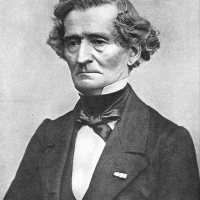Hector Berlioz
 FRAClassical, Orchestral, Chamber Music
FRAClassical, Orchestral, Chamber Music

 FRAClassical, Orchestral, Chamber Music
FRAClassical, Orchestral, Chamber MusicFrench composer and conductor Hector Berlioz is renowned for his work in the orchestral and classical music genres. Born in La Cote-Saint-Andre in 1803 and starting his musical career as a medical student, Berlioz soon discovered his love for music. He continued his education at the Paris Conservatoire, honing his composing and orchestration abilities there.
The emotional heft and vivid storytelling that define Berlioz's music. His compositions frequently include grand orchestral arrangements and intense operatic themes. He was a pioneer in the application of program music, which aimed to tell a tale or convey a narrative solely through music. His most well-known compositions include the Requiem, which was composed in memory of the fallen soldiers of the July Revolution, and the Symphonie fantastique, which tells the tale of an artist's unrequited love.
As a fervent supporter of the arts throughout his career, Berlioz put forth great effort to advance the classical and orchestral genres. His works on music and musicians contributed to form the cultural landscape of France in the 19th century. He was a prolific writer and critic. Although Berlioz passed away in 1869, his music continues to inspire and move listeners all over the world.
French composer Hector Berlioz is well-known for his contributions to symphonic and classical music. His most well-known compositions include "La Damnation de Faust, Op. 24/Part 1: Marche hongroise," "Die Walkure: Ride of the Valkyries," "Symphonie fantastique, Op. 14: IV. Marche au supplice," and "Les Troyens, Op. 29, H 133, Act V: No. 38. Vallon sonore."
Powerful and passionate, "Symphonie fantastique, Op. 14: IV. Marche au supplice" exemplifies Berlioz's skill of orchestration. It is a favorite among fans of classical music because of the dramatic impression that is produced by the employment of drums and brass instruments and develops to a climax. Another well-known song is "Die Walkure: Ride of the Valkyries," whose majestic and magnificent composition has been featured in a number of movies and TV series.
The gripping composition "La Damnation de Faust, Op.24/Part 1: Marche hongroise" by Berlioz combines Hungarian and French music. This tune stands out among Berlioz's compositions because of the variety of instruments and rhythms it uses. Another well-known track that exhibits Berlioz's distinctive compositional technique is "Les Troyens, Op. 29, H 133, Act V: No. 38. Vallon sonore".
Overall, Hector Berlioz's contributions to symphonic and classical music are still praised and appreciated by music lovers all over the world. His writings have weathered the test of time and still enthrall and inspire listeners today.
The French composer of classical and orchestral music, Hector Berlioz, has recently put out some incredible music albums and singles. His most recent recordings include "A Classical Coronation." 'Music for a Royal Celebration (2023)', 'His Erato Recordings (2023)', and 'Adagios (2023)'. Classical masterpieces by Berlioz are collected on each disc, demonstrating his extraordinary brilliance and artistry.
The most recent song by Berlioz, "Berlioz: Cleopatre, H 36: "C'en est donc fait!" (2023)," is a masterwork that perfectly encapsulates his own musical aesthetic. Another current song that demonstrates Berlioz's capacity to provoke emotions through his music is "Berlioz: Romeo et Juliette, Op. 17, H 79, Pt. 2: La Reine Mab (2023)." Les Nuits d'ete, Op. 7: I. Villanelle, a beautiful composition that displays Berlioz's extraordinary vocal and instrumental abilities, was issued by him in 2022. 'Berlioz: Un Bal, Op. 14 (2021)' is an additional song that demonstrates his extraordinary gift for writing music that is both captivating and motivating.
The majority of Berlioz's most recent musical albums and singles serve as evidence of his extraordinary talent and artistry. His music is still captivating listeners and influencing upcoming musical generations. No matter if you enjoy classical or orchestral music, Berlioz's compositions are bound to make an impression.
French classical and orchestral music composer Hector Berlioz worked with other artists on a number of significant projects. The Swedish Radio Symphony Orchestra and conductor Daniel Harding were involved in one of the most noteworthy collaborations for the piece "Symphonie fantastique, Op. 14: IV. Marche au supplice." This composition, which describes the opium-induced nightmares of a young artist, is regarded as one of Berlioz's most important pieces. Under Harding's guidance, the Swedish Radio Symphony Orchestra's performance garnered praise for its mastery of the difficult and complicated piece.
For "Die Walkure: "Ride of the Valkyries," Richard Wagner worked with the London Symphony Orchestra and horn player Barry Tuckwell on an important project. This famous composition, which contains a strong and victorious brass section, has appeared in a great number of motion pictures and television programs. The London Symphony Orchestra and Tuckwell's horn solo, in Berlioz's arrangement, give the composition a distinctive and entrancing new dimension.
The Boston Symphony Orchestra and Berlioz also worked together on the composition "Symphonie fantastique, Op. 14: V. Songe d'une nuit de sabbat. Larghetto - Allegro." The symphony's last movement portrays a witches' sabbath in a dramatic and powerful manner. Under the direction of conductor Seiji Ozawa, the Boston Symphony Orchestra's performance of the piece demonstrates the orchestra's talent and precision.
Overall, these associations show Berlioz's capacity to collaborate with other musicians to produce potent and enduring works of music. Each performance brings a fresh and compelling element to Berlioz's masterpieces, highlighting their complexity and range.